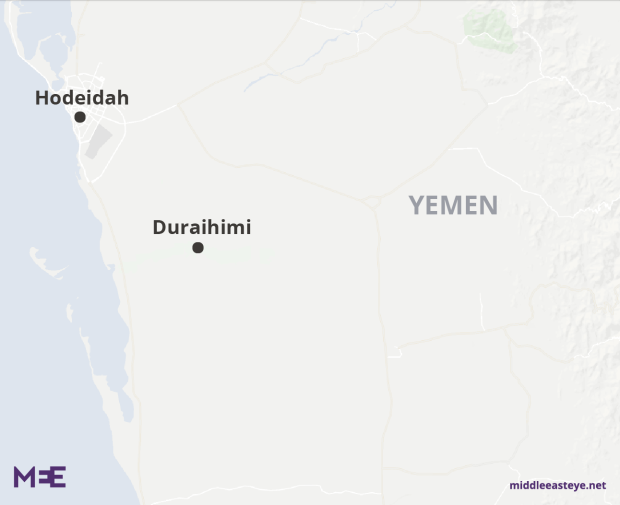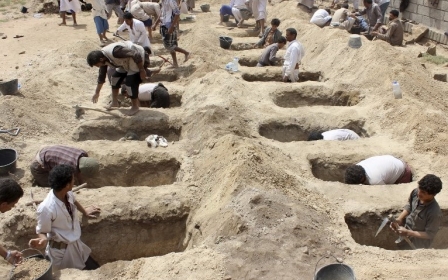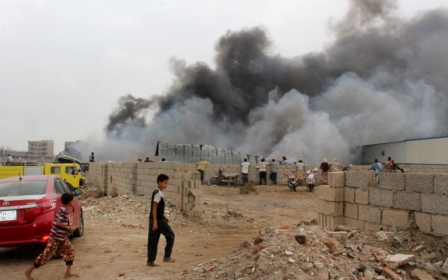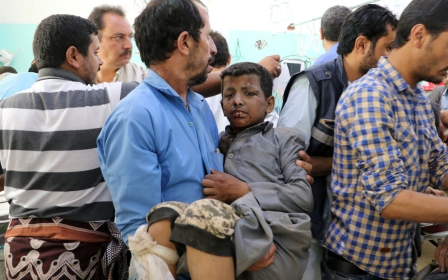Civilians trapped as fighting south of Yemen's Hodeidah renewed
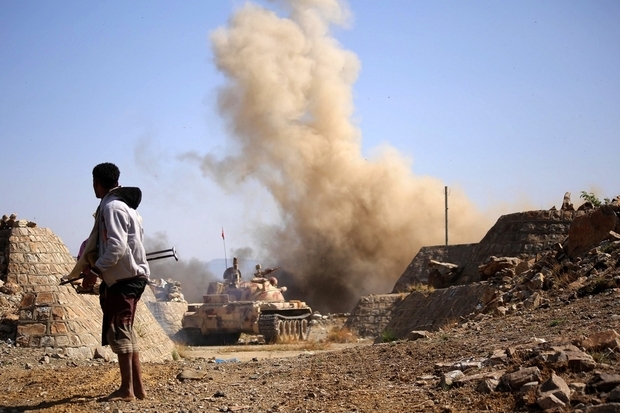
TAIZ, Yemen – After weeks of uneasy impasse, fighting south of Yemen’s port city of Hodeidah has flared up once again, as pro-government forces storm the adjacent city of Duraihami.
The pro-government forces, backed by Saudi and Emirati air power, have been besieging Duraihami since Sunday, and on Tuesday they launched an attack to prise it from Houthi rebels.
However, the city is heavily populated, with civilians struggling to escape as they are hemmed in by gunfire and blocked roads.
Poor internet coverage has badly hampered Duraihami residents' ability to contact the outside world, though early on Thursday Middle East Eye was able to get through to one man stuck in the beleaguered suburb.
There are some people that have bled to death [in the street] and no one dared to help them because of the clashes. Some corpses have decayed in the streets
- Ahmed Mubarak, Duraihimi resident
"There are street clashes in the town and many people were killed and wounded and no one has helped them," Ahmed Mubarak told MEE.
"The town lives under siege, and also we are under siege inside our houses, as the snipers in the city from both sides kill anyone who leaves his house to the street."
Local reports have said the city is being targeted by Saudi-led coalition air strikes, rocket attacks, artillery and a ground offensive.Tens of thousands of people have been killed in Yemen's war since a coalition led by Saudi Arabia and the United Arab Emirates entered in 2015 in support of the internationally recognised government fighting the Houthi rebels.
In June, pro-government forces launched an operation to take Hodeidah, a key city on the Red Sea coast through which the majority of Yemen's commerce and aid passes.
However, due to United Nations mediation efforts and an attempt to reorganise, the offensive has stopped short, with the focus now falling on Duraihami, another Houthi-held city in the western province.
Mubarak said that he wants to send a message to the international community, asking it to help Duraihami’s trapped civilians by stopping the battles and opening safe roads, even for one day, so they can flee their homes.
"There are some people that have bled to death [in the street] and no one dared to help them because of the clashes. Some corpses have decayed in the streets," he said.
"I appeal to the international [aid] organisations to intervene and help us before the war kills us."
Though some civilians have managed to flee Duraihami, Mubarak said they were only able to do so because they escaped before the fighting engulfed their neighbourhoods.
"The air strikes, rockets and snipers target the city randomly, so if we leave our houses, the fighting will kill us immediately. We still have food in our houses, but the food will run out if the organisations will not help soon."
Human shields
A source in the Amaliqa Brigade, a pro-government militia fighting in Hodeidah, told MEE his forces have captured much of the city and expect to hold it all soon.
"We know that some civilians have been killed in the battles on Tuesday and Wednesday, but we advise civilians to stay in the basements of their houses and prevent the Houthis from using them as human shields."
Conversely, the Houthis accused the pro-government forces and the Saudi-led coalition backing them of targeting civilians.
However, the Amaliqa source was keen to stress that civilians had only found themselves in pro-government forces’ sights because the Houthis were putting them there.
"We tried to attack parts of Duraihami city, but we found Houthi snipers spread on the houses of civilians, so the Houthis in some houses were targeted."
"We do our best to avoid killing civilians and targeting houses, as their safety is the most important issue for us, so we do not target the city randomly. If we didn't care about civilians we would recapture the city in few hours."
We advise civilians to stay in the basements of their houses and prevent the Houthis from using them as human shields
- Pro-government militia source
The Houthis also accuse the pro-government forces of targeting civilian homes randomly and preventing anyone from relieving injured people.
"The aggressor's mercenaries [the Saudi-led coalition and pro-government forces] are attacking the city randomly, and they have destroyed houses and killed civilians inside them," a Houthi fighter in Hodeidah told MEE on condition of anonymity because he was not authorised to speak to media.
"The air strikes killed dozens of civilians in Duraihami and they are still targeting civilians, while AnsarAllah [the Houthis] are fighting face-to-face on the ground."
Walking for hours
On Wednesday evening some fortunate families who fled the fighting arrived at safer areas outside the town, many after walking on foot for more than 24 hours.
"Some families walked from Tuesday evening till Wednesday evening, and they crossed dangerous roads where warring sides target people who go through," Sameer Sultan, a freelance journalist based in Hodeidah, told MEE.
The families used donkeys to carry their belongings, he said, adding that this is the only way for Duraihami residents to flee their city.
"The [international aid] organisations must intervene to relieve injured people and open safe roads for civilians to flee their city. Battles inside cities usually destroy them and kill civilians," Sultan said.
According to a source in Hodeidah's health office, dozens of civilians have been killed and wounded in Duraihami, some of them by air strikes and others by rockets, but there is no specific number of casualties.
"Most of the casualties are still inside the city, so we cannot give specific number of casualties as we cannot arrive to all of them. We hope that organisations can intervene to help people under the siege" he said.
"During the last two days more than 50 wounded and 15 dead have arrived al-Thawrah Hospital in Hodeidah, and the hospital has appealed to people to donate blood for the wounded."
New MEE newsletter: Jerusalem Dispatch
Sign up to get the latest insights and analysis on Israel-Palestine, alongside Turkey Unpacked and other MEE newsletters
Middle East Eye delivers independent and unrivalled coverage and analysis of the Middle East, North Africa and beyond. To learn more about republishing this content and the associated fees, please fill out this form. More about MEE can be found here.


